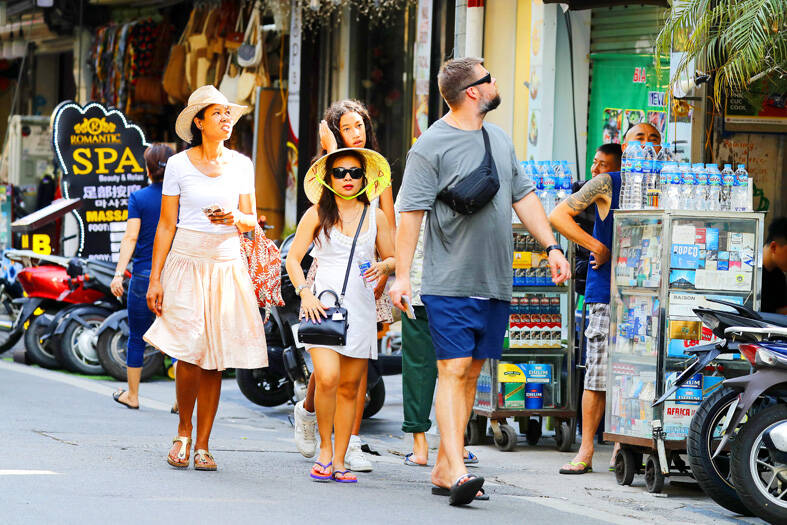Travel to Vietnam is expected to become slightly cheaper after the Southeast Asian nation on Monday night announced that all foreign visitors — including Taiwanese — are eligible to apply for a multiple-entry electronic visa, of which the validity has been extended to 90 days from 30 days.
The policy took effect yesterday after the National Assembly of Vietnam on June 24 passed amendments to the Law on Entry, Exit, Transit and Residence of Foreigners in Vietnam.
Before Taiwan was included in the e-visa program, Taiwanese who traveled to Vietnam needed to have a travel agency file visa applications on their behalf, which only permitted a single entry and was valid for 30 days.

Photo: EPA-EFE
The visa cost NT$1,300 to NT$1,500 per person, but travel agencies charged service fees, with the total cost ranging from NT$2,000 to NT$6,000.
Under the new policy, Taiwanese passport holders pay US$25 for an e-visa, without having to go through a travel agency.
An e-visa would normally be approved in about three work days after an application is submitted at https://dichvucong.bocongan.gov.vn/bocongan/bothutuc/tthc?matt=26277.
The Vietnamese Ministry of Public Security Web site has Vietnamese and English-language versions.
Pin Kuan International Travel Service Co assistant manager Kevin Hsiang (向建倫) said that the new policy would make it more convenient to apply for a tourism visa, but business travelers would benefit the most, as an e-visa allows them to enter the country multiple times.
Visa application fees skyrocketed when Vietnam reopened borders for tourism after the COVID-19 pandemic, but that was only for people on tourist visas who were not part of a group tour, Hsiang said.
People on package tours paid NT$1,300 per person for visas, so the e-visas mean they would save about NT$500, he said.
Vietnamese government data for this year show that 6.6 million international tourists had visited the Southeast Asian nation as of last month, on track to reach its target of 8 million.
Vietnam had 18 million visitors in 2019, with Taiwan its fourth-largest source, the data showed.

The manufacture of the remaining 28 M1A2T Abrams tanks Taiwan purchased from the US has recently been completed, and they are expected to be delivered within the next one to two months, a source said yesterday. The Ministry of National Defense is arranging cargo ships to transport the tanks to Taiwan as soon as possible, said the source, who is familiar with the matter. The estimated arrival time ranges from late this month to early next month, the source said. The 28 Abrams tanks make up the third and final batch of a total of 108 tanks, valued at about NT$40.5 billion

A group from the Taiwanese Designers in Australia association yesterday represented Taiwan at the Midsumma Pride March in Melbourne. The march, held in the St. Kilda suburb, is the city’s largest LGBTQIA+ parade and the flagship event of the annual Midsumma Festival. It attracted more than 45,000 spectators who supported the 400 groups and 10,000 marchers that participated this year, the association said. Taiwanese Designers said they organized a team to march for Taiwan this year, joining politicians, government agencies, professionals and community organizations in showing support for LGBTQIA+ people and diverse communities. As the first country in Asia to legalize same-sex

Travel agencies in Taiwan are working to secure alternative flights for travelers bound for New Zealand for the Lunar New Year holiday, as Air New Zealand workers are set to strike next week. The airline said that it has confirmed that the planned industrial action by its international wide-body cabin crew would go ahead on Thursday and Friday next week. While the Auckland-based carrier pledged to take reasonable measures to mitigate the impact of the workers’ strike, an Air New Zealand flight arriving at Taipei from Auckland on Thursday and another flight departing from Taipei for Auckland on Saturday would have to

MOTIVES QUESTIONED The PLA considers Xi’s policies toward Taiwan to be driven by personal considerations rather than military assessment, the Epoch Times reports Chinese President Xi Jinping’s (習近平) latest purge of the Chinese People’s Liberation Army (PLA) leadership might have been prompted by the military’s opposition to plans of invading Taiwan, the Epoch Times said. The Chinese military opposes waging war against Taiwan by a large consensus, putting it at odds with Xi’s vision, the Falun Gong-affiliated daily said in a report on Thursday, citing anonymous sources with insight into the PLA’s inner workings. The opposition is not the opinion of a few generals, but a widely shared view among the PLA cadre, the Epoch Times cited them as saying. “Chinese forces know full well that